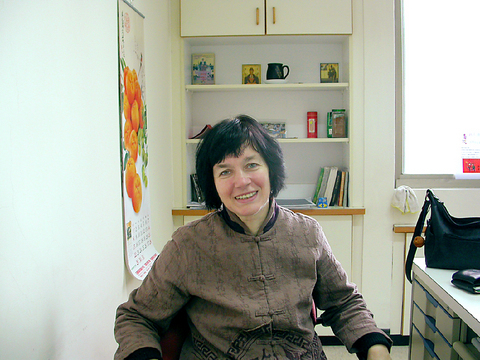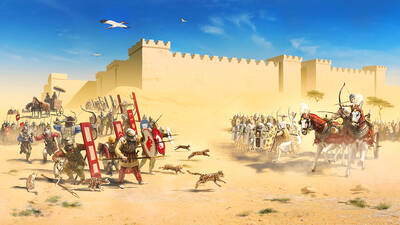For the Chinese, New Year's isn't over until the end of the Lantern Festival. But for Russians, because of their particular calendar system, the New Year holiday lasts for more than three weeks in all. Russian professor Mariana.V. Rumyantseva has offered to tell us how it is that the Russian holiday stretches over two different Christmas celebrations and two New Year's celebrations, as well as share her completley different experiences celebrating the New Year in Russia and in Taiwan.
中國新年要吃完元宵才算告一段落,而俄國因為曆法制度,佳節前後算起來也有三個多禮拜。來自俄羅斯的盧緬采娃教授要告訴我們為何俄國人有橫跨兩個聖誕節和兩個新年的佳節,並分享她在台灣與俄國截然不同的新年經驗。
While Chinese people are gorging themselves on mountains of food during the time of reunion to celebrate the New Year, Russians are abstainingfrom food. This happens because Russia uses two calendars: the Gregorian calendar and the Julian calendar. The latter is mostly used by the Russian Eastern Orthodox Church.

PHOTO: CHENG HSIANG-YI, TAIPEI TIMES
俄國因為有兩套曆法:格里曆法和俄國東正教所使用的尤里安曆法,所以正當台灣人在農曆新年期間大魚大肉,俄羅斯人在新年可是得勒緊肚皮守齋戒。
Usually the celebration of the New Year falls in the middle of a 40-day fast, during which Russians who follow the Orthodox faith can not eat meat, eggs or dairy products, nor can couples have sex, says Mariana.V. Rumyantseva, a Russian professor who has lived in Taiwan for over 11 years. She is therefore very struck by the abundant food and jubilant atmosphere in Taiwan during the Lunar New Year.
來台灣已經十一年的俄籍教授盧緬采娃解釋:「通常尤里安曆法中為期四十天的禁食期常會和新曆新年撞期,信奉東正教的俄國人在此期間不能吃肉、蛋、或任何乳製品,夫妻之間甚至不能行房。」因此她對台灣豐食歡騰的新年印象特別深刻。
When it comes to Chinese cuisine, she especially likes the symbolic dishes of the Lunar New Year, like 年糕 (nian2 gao1), a pastry made from the flour of glutinous rice served primarily during the Lunar New Year, whose name indicates attaining eminence step-by-step. She also enjoys a fish dish whose name, 年年有餘 (nian2 nian2 you3 yu2), means to have plenty to spare every year. Rumyantseva recalls being totally elated the first time she tasted a traditional dumpling, which is shaped like a gold ingot. She literally screamed at the top of her lungs with joy.
Ever since then, she has been completely captivated by Chinese cuisine. She bought a whole set of Chinese cooking utensils and invited Taiwanese students over to teach her how to cook. She paid for her cooking lessons by teaching the students Russian. Last year, on the second day of the Lunar New Year, she followed Taiwanese tradition by praying for blessings in Longshan Temple and buying a rooster, the symbol of the year of her birth on the Chinese horoscope. Due to the association often made by Chinese people between roosters and phoenixes, and the alliteration in Chinese between the sound of the words for phoenix and pineapple, she also purchased a pineapple, which signifies prosperity, to wish herself good luck in the new year.
談到中國美食,她喜歡一些過年的象徵性佳餚,例如:吃年糕求「步步高升」,魚代表「年年有餘」,尤其第一次嚐到長得像金元寶的水餃竟開心地叫了起來,還因此買了中菜廚具,以傳授俄文為學費,請台灣學生教她做菜。去年初二,她入境隨俗地到龍山寺祈福,買了象徵自己生肖的雞飾,又因中國人常將雞跟鳳凰做聯想,而鳳凰又和鳳梨押頭韻,更添購一顆象徵「旺來」的鳳梨,希望自己能在新年行大運。
Other than their eating habits, another difference between the ways Chinese and Russian people welcome the New Year is that Chinese put family first and spend the Lunar New Year's Eve only with their family, but Russians normally put religion before their blood relations. Whoever shares the same faith can also share the holiday with each other, she explained.
除了過年的飲食習慣,盧緬采娃更指出,重視家庭的中國人過年只跟家人相聚,而信奉東正教的俄國人重視信仰更勝親情,「信」趣相同的好友也能彼此相聚過新年。
Russian culture fact box:
俄國文化小字典:
Russians celebrate Christmas and New Year's twice each year.
俄國人每年有兩個聖誕節和兩個新年。
The Julian calendar was first introduced to Russia in the early 18th century and has become the reference for all religious holidays in Russia. For example, Christmas in Russia is not celebrated on Dec. 25, but on Jan. 1, and New Year's day falls on Jan. 11 rather than Jan. 1. In 1918 "for the purpose of being in harmony with all the civilized countries of the world," Russia abolished the Julian calendar and adopted the Gregorian calendar, which is the calendar commonly used worldwide. The Gregorian calendar is 13 days ahead of the Julian calendar. However, people resumed using the Julian calendar in the 1980s, so Christmas and New Years on both calendars are all holidays for Russians. In other words, the holiday goes all the way from Dec. 25 to Jan. 14. "Now that I live in Taiwan, I get to celebrate the Lunar New Year as well, which means an even longer holiday for me." Rumyantseva says with a smile.
尤里安曆法於西元十八世紀初進入俄國,俄國境內凡是宗教節慶都是以尤里安曆法為依據,例如,俄國的聖誕節不是十二月二十五日,而是一月七日,新年則是一月十四日,而不是一月一日。一九一八年,「為與文明世界同步」,俄國政府採行格里曆法,也就是現在世界通用的曆法,(尤里安曆法比新曆晚十三天),廢除尤里安曆法。由於八○年代又恢復使用尤里安曆法,所以這兩套曆法的聖誕節和新年對俄國人來說都是節日,可以一路從十二月二十五日歡慶到一月十四日,盧緬采娃笑說:「我現在住在台灣,加上中國新年,假期又可以長一些了。」
Wine is indispensible during the holiday season as well as in daily life.
酒在節慶和日常生活同樣不可或缺。
Rumyantseva points out that drinking is a quintessential part of the Russian way of living, so naturally some people indulge in a little heavy drinking during the celebration of the New Year. When Chinese people say they know a person, they say "We once ate together," but Russians say "We once drank together." There is no way you can get away with not drinking when associating with Russians. Giving them a flat denial would be considered a breach of etiquette. They believe you have to have a couple of glasses of wine and show your true colors before you can call someone your friend. Besides, if someone is a bad drunk, it could indicate whether or not you should be friends with him or her.
盧緬采娃說,飲酒是俄國人生活中不可或缺的一部分,只不過有些人會在新年期間放縱自己一下。中國人若說認識一個人,會說「我跟他吃過飯」,但是俄國人會說「我跟他喝過酒」。跟俄國人來往,絕對免不了小酌一下,斷然拒絕會被視為無禮的行為,因為俄國人相信,酒後吐真言,三杯下肚後若能流露真誠情感才算好友,此外,若此人酒品不佳,也可趁機考量是否與他繼續來往。

US President Donald Trump on Monday last week signed the TAKE IT DOWN ACT (Tools to Address Known Exploitation by Immobilizing Technological Deepfakes on Websites and Networks Act), bipartisan legislation that enacts stricter penalties for the distribution of non-consensual intimate imagery, sometimes called “revenge porn,” as well as deepfakes created by artificial intelligence. The measure, which goes into effect immediately, was introduced by Sen. Ted Cruz, a Republican from Texas, and Sen. Amy Klobuchar, a Democrat from Minnesota, and later gained the support of First Lady Melania Trump. Critics of the measure, which addresses both real and artificial intelligence-generated imagery, say

Cats ruled in ancient Egypt—and not just in their own minds. These clever, graceful creatures were so deeply respected by the Egyptians that harming one could lead to severe punishment, even death. But why did the Egyptians hold cats in such high regard? It wasn’t just because they were cute; cats played a crucial role in protecting the country’s grain stores from pests. As guardians of Egypt’s food supply, they were seen as sacred animals. The Egyptians honored them through Bastet, the cat-headed goddess of protection, the home and fertility. Egyptians didn’t just love cats; they worshipped them. Cats lived in luxury,

A: Wanna go see a movie during the three-day weekend for the Dragon Boat Festival? B: Sure, I wanna see “Mission: Impossible – The Final Reckoning.” A: Rumor has it that this may be actor Tom Cruise’s last mission with the Mission: Impossible action movie franchise. B: Tom was only 34 when the first installment of the series was released in 1996. Now, he’s 63 and the eighth installment is out. A: I hope he’ll stay with the series. Let’s go see him fight against AI this weekend. A: 端午節三天連假週末要不要去看電影? B: 好啊我想看 《不可能的任務:最終清算》! A: 這有可能是湯姆克魯斯最後一次為動作片《不可能》系列出任務。 B:

Continued from yesterday(延續自昨日) https://www.taipeitimes.com/News/lang Despite these advantages, there are still some challenges when it comes to housing data centers under the ocean. One problem is that they’re difficult to access for repair or replacement. __4__ This presents a significantly higher level of complexity than handling traditional land-based data centers. Another challenge is energy reliability. Many underwater data centers rely on offshore renewable energy sources, which can be unstable due to environmental factors. While underwater data centers offer exciting possibilities, overcoming the associated challenges is essential to realizing their full potential. 儘管有這些優勢,在海底安置資料中心仍存在一些難關。一個問題是難以進入水下資料中心進行修理或更換。這需要派人員到水下或將資料中心運送到維修站。這比處理傳統的陸上資料中心還要複雜許多。另一個難關是能源可靠性。許多水下資料中心依賴近海再生能源,而這些能源可能會因環境因素而不穩定。雖然水下資料中心提供了令人興奮的可能性,但要充分發揮其潛力,克服相關的難題是相當重要的。 What Did You Learn? (A) However, the expense of housing and maintaining the facilities